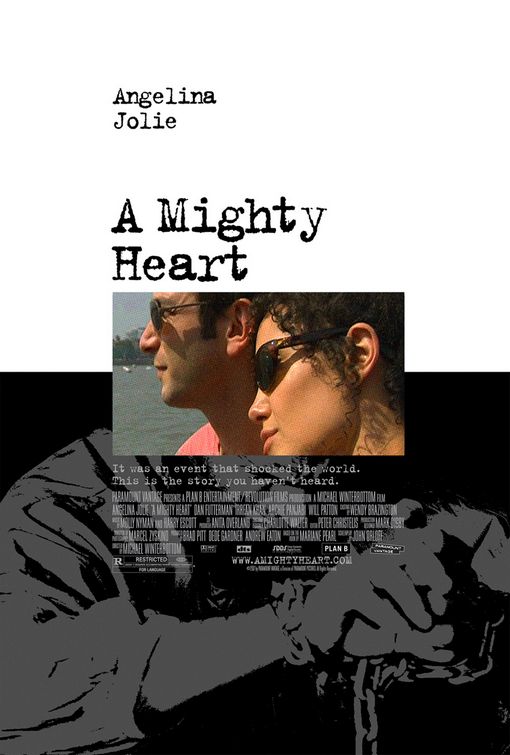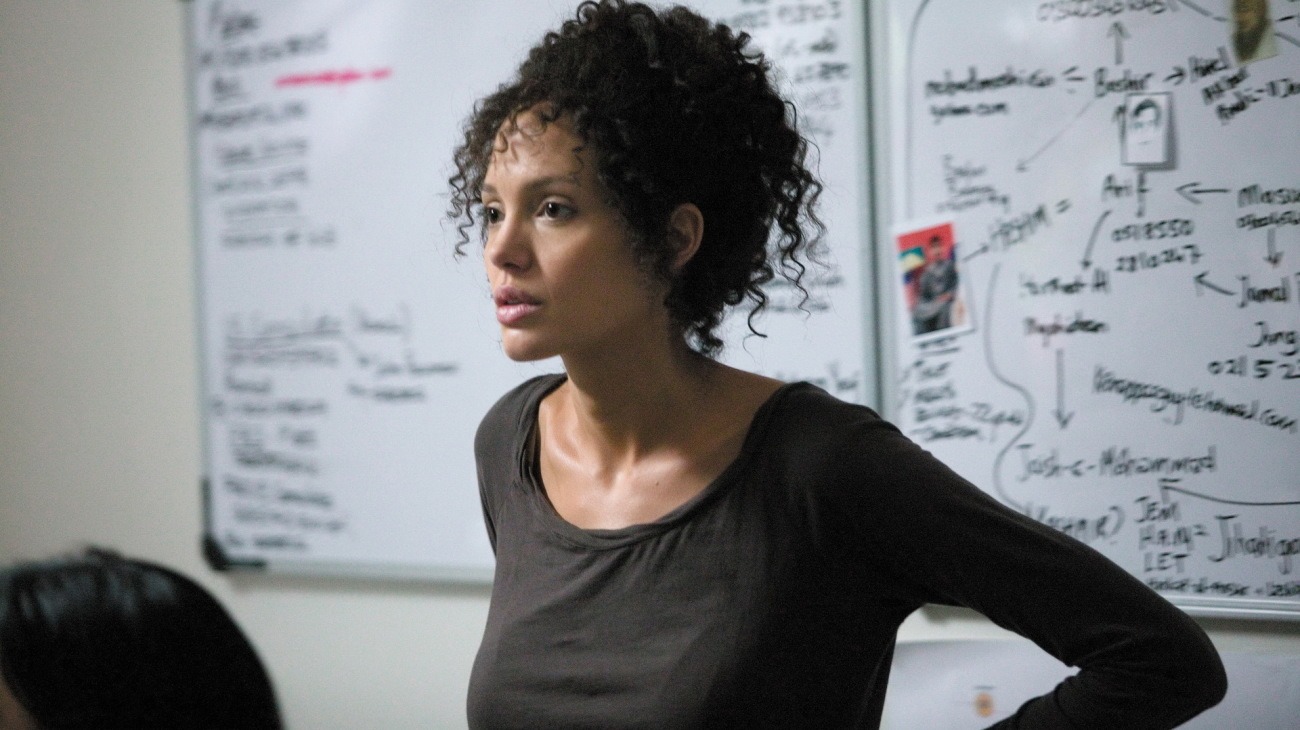
Till death do us part
As I'm sure just about everyone knows by now, A Mighty Heart is the fact-based story of Mariane Pearl (Angelina Jolie), the pregnant French-born Afro-Cuban Dutch-Jewish journalist who suffered through an extraordinarily terrible month in early 2002, when her Jewish-American husband Daniel (Dan Futterman) of the Wall Street Journal was kidnapped by Islamic extremists at the end of the Pearls' stay in Pakistan, and decapitated by the terrorists while being filmed on video.
Your guess is as good as mine as to how this got a summer release date. But I'm glad it did. Just because it's hot out doesn't mean that we can't handle a bit of the old painful emotional catharsis.
One might think that this story, director Michael Winterbottom's first project after The Road to Guantanamo, would be used to make a political point (at least, I did), and one would be mostly wrong in thinking that. First, A Mighty Heart is a love story, showing in copious flashbacks the nature of Mariane and Danny's life together and focusing in the present on her suffering as she waits for days and weeks to learn if her husband is alive. Second, it is a police procedural, and a very taut one indeed, pushing forward with the Pakistani anti-terrorist chief known just as the Captain (Irfan Khan) as he becomes ever more torn about by the strain of his investigation. Third, and a rather distant third at that, it's about the torturous relationship between the Islamic world and the West, and the international implications of this one murder.
I'm not even so sure that I would argue that this film falls into the rather dubious path of using one personal tragedy to dramatise the crumbling of society around it. It rather seems like the film uses personal tragedy as personal tragedy, taking place within a chaotic world, and caused by it; but the director's bona fides notwithstanding, what's interesting about A Mighty Heart is not the political arena, but the individual human beings inside it.
Obviously, the primary human being in question is Mariane Pearl, and the woman playing her has come under quite as much scrutiny as any celebrity playing a real-life character in a prestige picture ever has, for no real reason. The easiest way to deflect that is by noting that Ms. Pearl was asked by the producers (one of whom was coincidentally Brad Pitt - and yes, I do think it was a coincidence) to name the actress that she most wanted to play herself in all the world, and given that freedom, she did what most of us would do: name someone incredibly famous and beautiful.
More importantly, Jolie is fantastic in the role, easily her career-best performance. I find that I am not quite "alone," but certainly not in any sort of majority for finding that I was able to forget that the most famous women in modern civilisation was onscreen, but there you have it. Her big showstopping Oscarbait moment, learning about Danny's death, is of course very BIG, but not really at all sentimentally exploitative as you might fear; Jolie's cries of pain are the sort of giant emotion that work despite seeming clichéd, largely because of the extraordinary black depths that they rise screaming from (I don't know where Jolie had to go for that moment, but it was not a happy place). But that's not what I find myself thinking of anyway; I remember the little moments scattered all through the film where Mariane is simply waiting and worrying and clutching her unborn baby.
Let me end by saying how brilliant I found the editing in A Mighty Heart. Peter Chistelis has worked on several of Winterbottom's in some capacity or another, and if any director can be noted for the consistently high quality of the editing in his films, that's the one. In this particular case, it's a driving rhythm of editing established from the very first cut in the credits before the film even begins. Of course, I wasn't watching the film with a stopwatch, but my impression, based on all of the times I remembered to look for it, is that the film proceeds with a very steady pattern of cuts every few seconds (3.5? 4? I said I didn't have a stopwatch) that keeps the tension literally pulsating throughout. The immediate and best comparison to make is to a human heartbeat, constantly throbbing with anxiety, and it can hardly be a coincidence that all of the long shots, the ones that let us sit back and breathe, come during narrative moments of relative tranquility.
One giant caveat: the last ten or fifteen minutes of the film descend into all of the hagiographic sentimentality that the film had done so very, very well at avoiding 'til that point. Ah well, can't have everything.
Your guess is as good as mine as to how this got a summer release date. But I'm glad it did. Just because it's hot out doesn't mean that we can't handle a bit of the old painful emotional catharsis.
One might think that this story, director Michael Winterbottom's first project after The Road to Guantanamo, would be used to make a political point (at least, I did), and one would be mostly wrong in thinking that. First, A Mighty Heart is a love story, showing in copious flashbacks the nature of Mariane and Danny's life together and focusing in the present on her suffering as she waits for days and weeks to learn if her husband is alive. Second, it is a police procedural, and a very taut one indeed, pushing forward with the Pakistani anti-terrorist chief known just as the Captain (Irfan Khan) as he becomes ever more torn about by the strain of his investigation. Third, and a rather distant third at that, it's about the torturous relationship between the Islamic world and the West, and the international implications of this one murder.
I'm not even so sure that I would argue that this film falls into the rather dubious path of using one personal tragedy to dramatise the crumbling of society around it. It rather seems like the film uses personal tragedy as personal tragedy, taking place within a chaotic world, and caused by it; but the director's bona fides notwithstanding, what's interesting about A Mighty Heart is not the political arena, but the individual human beings inside it.
Obviously, the primary human being in question is Mariane Pearl, and the woman playing her has come under quite as much scrutiny as any celebrity playing a real-life character in a prestige picture ever has, for no real reason. The easiest way to deflect that is by noting that Ms. Pearl was asked by the producers (one of whom was coincidentally Brad Pitt - and yes, I do think it was a coincidence) to name the actress that she most wanted to play herself in all the world, and given that freedom, she did what most of us would do: name someone incredibly famous and beautiful.
More importantly, Jolie is fantastic in the role, easily her career-best performance. I find that I am not quite "alone," but certainly not in any sort of majority for finding that I was able to forget that the most famous women in modern civilisation was onscreen, but there you have it. Her big showstopping Oscarbait moment, learning about Danny's death, is of course very BIG, but not really at all sentimentally exploitative as you might fear; Jolie's cries of pain are the sort of giant emotion that work despite seeming clichéd, largely because of the extraordinary black depths that they rise screaming from (I don't know where Jolie had to go for that moment, but it was not a happy place). But that's not what I find myself thinking of anyway; I remember the little moments scattered all through the film where Mariane is simply waiting and worrying and clutching her unborn baby.
Let me end by saying how brilliant I found the editing in A Mighty Heart. Peter Chistelis has worked on several of Winterbottom's in some capacity or another, and if any director can be noted for the consistently high quality of the editing in his films, that's the one. In this particular case, it's a driving rhythm of editing established from the very first cut in the credits before the film even begins. Of course, I wasn't watching the film with a stopwatch, but my impression, based on all of the times I remembered to look for it, is that the film proceeds with a very steady pattern of cuts every few seconds (3.5? 4? I said I didn't have a stopwatch) that keeps the tension literally pulsating throughout. The immediate and best comparison to make is to a human heartbeat, constantly throbbing with anxiety, and it can hardly be a coincidence that all of the long shots, the ones that let us sit back and breathe, come during narrative moments of relative tranquility.
One giant caveat: the last ten or fifteen minutes of the film descend into all of the hagiographic sentimentality that the film had done so very, very well at avoiding 'til that point. Ah well, can't have everything.






